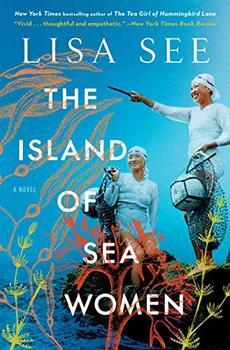Summary | Excerpt | Reading Guide | Reviews | Beyond the Book | Readalikes | Genres & Themes | Author Bio

Swallowing Water Breath
April 1938
My first day of sea work started hours before sunrise when even the crows were still asleep. I dressed and made my way through the dark to our latrine. I climbed the ladder to the stone structure and positioned myself over the hole in the floor. Below, our pigs gathered, snuffling eagerly. A big stick leaned against the wall in the corner in case one of them became too enthusiastic and tried to leap up. Yesterday I'd had to hit one pretty hard. They must have remembered, because this morning they waited for my private business to drop to the ground to fight among themselves for it. I returned to the house, tied my baby brother to my back, and went outside to draw water from the village well. Three round trips, carrying earthenware jugs in my hands, were required to get enough water to satisfy our morning needs. Next, I gathered dung to burn for heating and cooking. This also had to be done early, because I had a lot of competition from other women and girls in the village. My chores done, my baby brother and I headed home.
Three generations of my family lived within the same fence—with Mother, Father, and us children in the big house and Grandmother in the little house across the courtyard. Both structures were built from stone and had thatch roofs weighed down with additional stones to keep the island wind from blowing them away. The big house had three rooms: a kitchen, the main room, and a special room for women to use on their wedding nights and after they'd given birth. In the main room, oil lamps flickered and sputtered. Our sleeping mats had already been folded and stacked against the wall.
Grandmother was awake, dressed, and drinking hot water. Her hair was covered by a scarf. Her face and hands were bony and the color of chestnuts. My first and second brothers, twelve and ten years old, sat cross-legged on the floor, knees touching. Across from them, Third Brother squirmed as only a seven-year-old boy can. My little sister, six years younger than I was, helped our mother pack three baskets. Mother's face was set in concentration as she checked and double-checked that she had everything, while Little Sister tried to show she was already training to be a good haenyeo.
Father ladled the thin millet soup that he'd prepared into bowls. I loved him. He had Grandmother's narrow face. His long, tapered hands were soft. His eyes were deep and warm. His callused feet were almost always bare. He wore his favorite dog-fur hat pulled down over his ears and many layers of clothes, which helped to disguise how he sacrificed food, so his children could eat more. Mother, never wasting a moment, joined us on the floor and nursed my baby brother as she ate. As soon as she was done with her soup and the feeding, she handed the baby to my father. Like all haenyeo husbands, he would spend the rest of the day under the village tree in Hado's central square with other fathers. Together, they'd look after infants and young children. Satisfied that Fourth Brother was content in Father's arms, Mother motioned for me to hurry. Anxiety rattled through me. I so hoped to prove myself today.
The sky was just beginning to turn pink when Mother, Grandmother, and I stepped outside. Now that it was light, I could see my steamy breath billowing then dissipating in the cold air. Grandmother moved slowly, but Mother had efficiency in every step and gesture. Her legs and arms were strong. Her basket was on her back, and she helped me with mine, securing the straps. Here I was, going to work, helping to feed and care for my family, and becoming a part of the long tradition of haenyeo. Suddenly I felt like a woman.
Mother hoisted the third basket, holding it before her, and together we stepped through the opening in the stone wall that protected our small piece of property from prying eyes and the relentless wind. We wended our way through the olle—one of thousands of stone-walled pathways that ran between houses and also gave us routes to crisscross the island. We stayed alert for Japanese soldiers. Korea had now been a Japanese colony for twenty-eight years. We hated the Japanese, and they hated us. They were cruel. They stole food. Inland, they rustled livestock. They took and took and took. They'd killed Grandmother's parents, and she called them chokpari—cloven-footed ones. Mother always said that if I was ever alone and saw colonists, whether soldiers or civilians, I should run and hide, because they'd ruined many girls on Jeju.
Excerpted from The Island of Sea Women by Lisa See. Copyright © 2019 by Lisa See. Excerpted by permission of Scribner. All rights reserved. No part of this excerpt may be reproduced or reprinted without permission in writing from the publisher.




Show me the books he loves and I shall know the man...
Click Here to find out who said this, as well as discovering other famous literary quotes!
Your guide toexceptional books
BookBrowse seeks out and recommends the best in contemporary fiction and nonfiction—books that not only engage and entertain but also deepen our understanding of ourselves and the world around us.